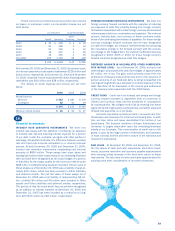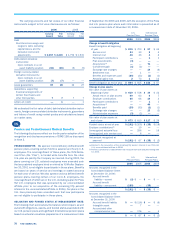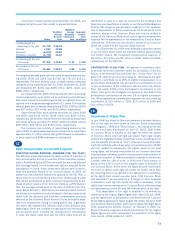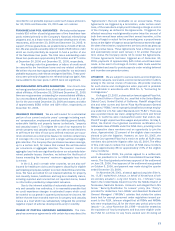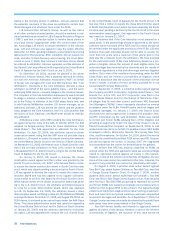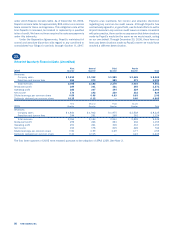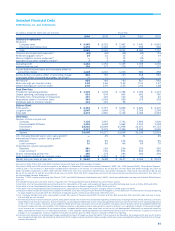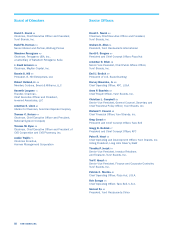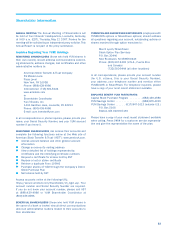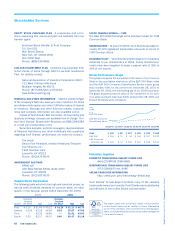Pizza Hut 2006 Annual Report Download - page 74
Download and view the complete annual report
Please find page 74 of the 2006 Pizza Hut annual report below. You can navigate through the pages in the report by either clicking on the pages listed below, or by using the keyword search tool below to find specific information within the annual report.
79
predicted at this time. Likewise, the amount of any potential loss
cannot be reasonably estimated.
On December 17, 2002, Taco Bell was named as the defen-
dant in a class action lawsuit filed in the United States District
Court for the Northern District of California styled Moeller, et al.
v. Taco Bell Corp. On August 4, 2003, plaintiffs filed an amended
complaint that alleges, among other things, that Taco Bell has
discriminated against the class of people who use wheelchairs
or scooters for mobility by failing to make its approximately 220
company-owned restaurants in California (the “California Res-
taurants”) accessible to the class. Plaintiffs contend that queue
rails and other architectural and structural elements of the Taco
Bell restaurants relating to the path of travel and use of the facili-
ties by persons with mobility-related disabilities (including parking
spaces, ramps, counters, restroom facilities and seating) do not
comply with the U.S. Americans with Disabilities Act (the “ADA”),
the Unruh Civil Rights Act (the “Unruh Act”), and the California
Disabled Persons Act (the “CDPA”). Plaintiffs have requested: (a)
an injunction from the District Court ordering Taco Bell to comply
with the ADA and its implementing regulations; (b) that the District
Court declare Taco Bell in violation of the ADA, the Unruh Act, and
the CDPA; and (c) monetary relief under the Unruh Act or CDPA.
Plaintiffs, on behalf of the class, are seeking the minimum statu-
tory damages per offense of either $4,000 under the Unruh Act
or $2,000 under the CDPA for each aggrieved member of the
class. Plaintiffs contend that there may be in excess of 100,000
individuals in the class. For themselves, the four named plaintiffs
have claimed aggregate minimum statutory damages of no less
than $16,000, but are expected to claim greater amounts based
on the number of Taco Bell outlets they visited at which they claim
to have suffered discrimination.
On February 23, 2004, the District Court granted Plaintiffs’
motion for class certification. The District Court certified a Rule
23(b)(2) mandatory injunctive relief class of all individuals with
disabilities who use wheelchairs or electric scooters for mobility
who, at any time on or after December 17, 2001, were denied, or
are currently being denied, on the basis of disability, the full and
equal enjoyment of the California Restaurants. The class includes
claims for injunctive relief and minimum statutory damages.
Pursuant to the parties’ agreement, on or about August 31,
2004, the District Court ordered that the trial of this action be
bifurcated so that stage one will resolve Plaintiffs’ claims for
equitable relief and stage two will resolve Plaintiffs’ claims for
damages. The parties are currently proceeding with the equitable
relief stage of this action. During this stage, Taco Bell filed a
motion to partially decertify the class to exclude from the Rule
23(b)(2) class claims for monetary damages. The District Court
denied the motion. Plaintiffs filed their own motion for partial
summary judgment as to liability relating to a subset of the Cali-
fornia Restaurants. The District Court denied that motion as well.
Discovery is ongoing as of the date of this report.
Taco Bell has denied liability and intends to vigorously defend
against all claims in this lawsuit. Although this lawsuit is at a
relatively early stage in the proceedings, it is likely that certain
of the California Restaurants will be determined to be not fully
compliant with accessibility laws, and Taco Bell has begun to
take certain steps to make those restaurants compliant. How-
ever, at this time, it is not possible to estimate with reasonable
certainty the potential costs to bring non-compliant California
Restaurants into compliance with applicable state and federal
disability access laws. Nor is it possible at this time to reason-
ably estimate the probability or amount of liability for monetary
damages on a class-wide basis to Taco Bell.
According to the Centers for Disease Control (“CDC”), there
was an outbreak of illness associated with a particular strain of
E. coli 0157:H7 in the northeast United States during November
and December 2006. Also according to the CDC, the outbreak
from this particular strain was associated with eating at Taco Bell
restaurants in Pennsylvania, New Jersey, New York and Delaware.
The CDC concluded that the outbreak ended on or about Decem-
ber 6, 2006. The CDC has confirmed 71 cases of persons who
became ill from this particular strain of E. coli 0157:H7 in the
above-mentioned area during the above time frame, and that no
deaths have been reported.
On December 6, 2006, a lawsuit styled Tyler Vormittag, et al.
v. Taco Bell Corp., Taco Bell of America, Inc. and Yum! Brands, Inc.
was filed in the Supreme Court of the State of New York, County
of Suffolk. Mr. Vormittag, a minor, alleges he became ill after
consuming food, which was allegedly contaminated with E. coli
0157:H7, purchased from a Taco Bell restaurant in Riverhead,
New York. Subsequently, ten other cases have been filed naming
the Company, Taco Bell Corp. and/or Taco Bell of America and
alleging similar facts on behalf of other customers.
According to the allegations common to all the Complaints,
each Taco Bell customer became ill after ingesting contaminated
food in late November or early December 2006 from Taco Bell
restaurants located in the northeast states implicated in the
outbreak. As these lawsuits are new, no discovery by any party
has been undertaken. However, the Company believes, based on
the allegations, that the stores identified in at least five of the
Complaints are in fact not owned by the Company or any of its
subsidiaries. As such, the Company believes that at a minimum
it is not liable for any losses at these stores. We have provided
for the estimated costs of this litigation, based on a projection of
potential claims and their amounts as well as the results of settle-
ment negotiations in similar matters. But in view of the inherent
uncertainties of litigation, there can be no assurance that the out-
come of the litigation will not result in losses in excess of those
currently provided for in our Consolidated Financial Statements.
PROPOSED INTERNAL REVENUE SERVICE ADJUSTMENTS
Recently, the Internal Revenue Service (the “IRS”) informed the
Company of its intent to propose certain adjustments based
on its position that the Company did not file Gain Recognition
Agreements (“GRAs”) on a timely basis in connection with certain
transfers of foreign subsidiaries among its affiliated group. The
Company plans to seek clarification of the IRS’s position. Based
on the Company’s current understanding of the IRS’s position,
the Company believes that the filing of GRAs in this matter was
not required; and it further believes that, even if required, the
Company would be granted relief for a later filing. Although the
Company believes that the IRS’s position will not be upheld, if
the IRS were to prevail, the Company could be required to make
incremental tax payments that would be material in amount. The
Company intends to vigorously contest the IRS’s position and does
not believe that the resolution of this matter will have a material
adverse impact on the Company’s financial results or condition.
OBLIGATIONS TO PEPSICO, INC. AFTER SPIN-OFF In connection
with the Spin-off, we entered into separation and other related
agreements (the “Separation Agreements”) governing the Spin-off
and our subsequent relationship with PepsiCo. These agreements
provide certain indemnities to PepsiCo.
Under terms of the agreement, we have indemnified PepsiCo
for any costs or losses it incurs with respect to all letters of credit,
guarantees and contingent liabilities relating to our businesses


